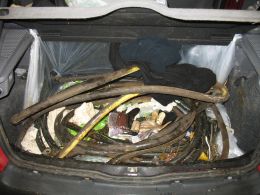Posted 12th September 2011 | 3 Comments
Scrap metal clampdown urged as cable thefts soar

ONE of the major transport groups in Britain is calling for an urgent clampdown on rail cable thefts, which a government minister has estimated is costing £1 billion a year.
Stagecoach chief Brian Souter says the scrap metal trade must be 'robustly' licensed, to make it harder for thieves to dispose of stolen cable.
There have more incidents over the past few days, some of which have affected passengers in the London area travelling from London Bridge and Paddington.
In one of these incidents, 65 metres of cable was cut and removed at Bermondsey in south London during the early hours of 6 September, causing widespread disruption.
146 trains were cancelled, 129 other services curtailed and 840 trains delayed, according to British Transport Police. In all, 11,000 delay minutes were logged. A man and a woman were arrested, and have been questioned by police.
Meanwhile, delays on the West Coast Main Line the day before were attributed to a cable damaged by would-be thieves at Brandon, near Coventry.
The sharp rise in thefts has been fuelled by a boom in the price of copper on world markets, and although Network Rail has fought back by identifying its cable in various ways, industry sources concede that once cable cores are extracted and melted down they become untraceable.
Thiefs have also been trying new techniques, including at least one attempt to melt cable at the scene with a domestic barbeque.
In another recent incident thieves cut and removed earthing straps from a freight train stabled at Doncaster. Police said the metal would be almost worthless but the theft, over the night of 2 September, caused damage costing £3,000 and potentially put the lives of railway employees at risk.
Brian Souter of Stagecoach warned that the effect of cable thefts on railway services was now 'huge'.
He said: "Many rail customers know from bitter personal experience the terrible affect this can have on their daily lives. In June, thousands of our own passengers were severely delayed by a major cable theft incident. As well as the human cost of disruption, criminal activity in this area is now so damaging to our wider economy that we simply must act."
Sir Brian's proposed licensing system would include controls on scrap merchants requiring them take steps to reduce the risk that stolen materials are handled.
He also wants scrap dealers to be licensed like alcohol sellers, with new police powers to close down scrap yards, a strict ban on cash deals, a holding period for newly purchased scrap so that payments can be processed, proper records kept of customers, and a provision that property handled in breach of the proposed rules would be treated as criminal assets.
Sir Brian added: "There are many entirely legitimate businesses operating in this arena and there is no desire to penalise them. Improved legislation should actually benefit the business of legitimate metal recycling companies, as well as increasing the amount of tax payments to the Treasury. We urgently need support across Government to make very rapid progress on this important issue."
Transport minister Norman Baker has estimated that cable thefts are now costing £1 billion a year, and Network Rail network managing director Robin Gisby said: "Cable theft is a huge issue and one which the rail industry is committed to tackling – but we can’t do it alone. We need to see tougher sentences for cable thieves in the courts and the police must be given the powers they need to tackle the rogue scrap dealers who are profiting from the travelling public’s misery."
British Transport Police deputy chief constable Paul Crowther, who heads the ACPO Metal Theft Working Group, pointed out that the problem is not confined to the railway.
He said: "There is no doubt that metal theft is a huge problem for the UK and it affects all types of industry in a variety of different ways. There have been incidents around the country in which homes, businesses and even hospitals have suffered power cuts and surges as a result of criminals stealing copper from power substations.
"Metal theft also causes significant disruption to rail services and that means real consequences for real people - missed business meetings, family celebrations and appointments for instance. And that’s not to mention the huge financial costs to the rail industry and the dangers to the thieves themselves.
"We have increased the resources we are devoting to this issue and are working closely with Network Rail to find more effective ways of reversing this trend."
Reader Comments:
Views expressed in submitted comments are that of the author, and not necessarily shared by Railnews.

D.Sumner, warrington, cheshire
I think government should introduce a pass with photo and address for anybody wishing to sell scrap and have regular police checks to see its being used correctly , any scrapyard not complying should be closed and their scrap confiscated.
IDM, london
Given the attitude of the current government, you are more likely to see the existing registration requirements removed as a burden to business
Neil Scoggins, Ipswich, UK
See HM Government e-petition: (submissions.epetitions.direct.gov.uk/petitions/406)
Cashless Scrap Metal Trade - Amendment to Scrap Metal Merchants Act 1964